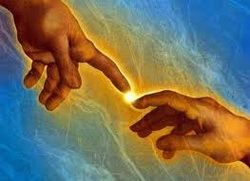 io9.com
io9.com That's the bit that fascinates me—the future. You'll see four futuristic novels on my sidebar, where my writing partner and I take on the perspectives of survivors after the Great Flood in Britland. Wind Over Troubled Waters is the first.
Stephen Hawking publicly revealed his thoughts on the landmark discovery of the God Particle—the particle scientists say is responsible for mass in the standard model of physics.
Hawking also gave his prediction for the end of the world. "I don't think we will survive another thousand years without escaping beyond our fragile planet. I therefore want to encourage public interest in space," he said.
Stephen Hawking was born on Jan 8th, 1942, as was I. That makes me feel very close to him. I imagine us on a cloud waiting for the moment of our birth, discussing what we'd do with our lives. I'm so proud of what he's achieved—although I don't understand half of what he's theorized about. But back to the subject.
Higgs boson essentially holds the universe together. It gives particles mass, which allows them to bind together and form things, like stars and planets and my home and yours.
 blob.zap2it.com
blob.zap2it.com To make the particle easier to understand, the Chicago Tribute published an article in 2012. They spoke to David Miller, a professor of physics at Purdue University and part of the multinational team of scientists on the Higgs project.
He said he understands the subject's complexity but believes people can at least appreciate the importance — and power — of understanding the world around us.
"We're the only species that can ask the question, 'Why?' and also has the tools to answer it," Miller said. "Any person can go out at night and look at the stars in the sky and wonder what place we have in the universe. We're a tiny speck, but it appears that from our little planet we can not only understand our whole universe, we can understand its evolution from the big bang."
The human brain is astounding, as is the whole creation. I'd like to believe we are all part of the Creator.

 RSS Feed
RSS Feed






